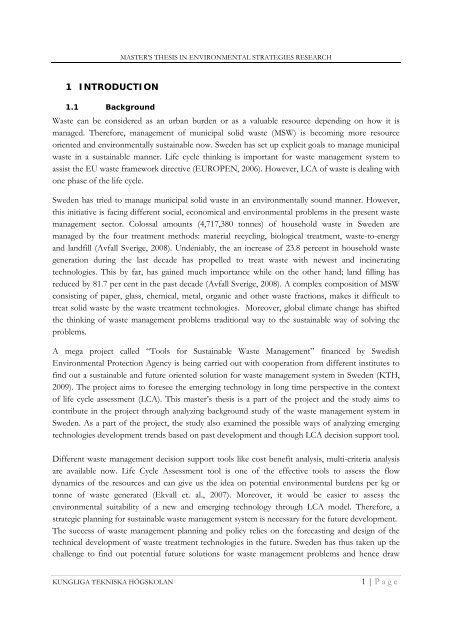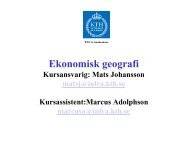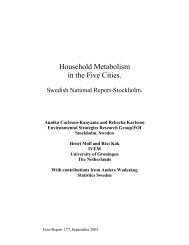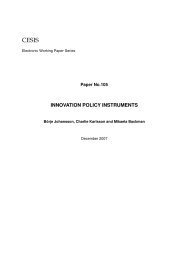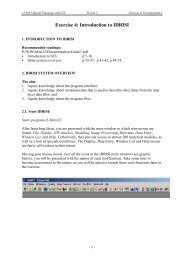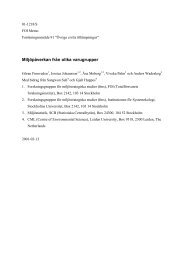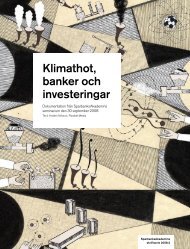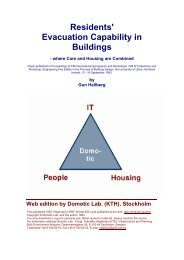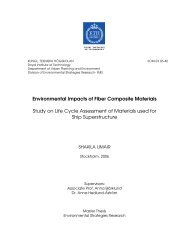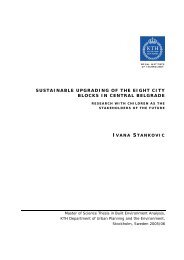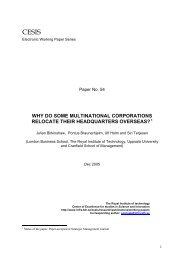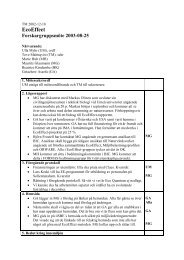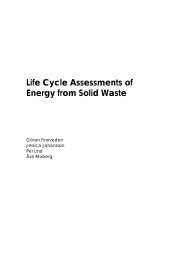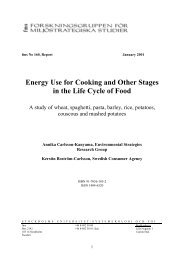Technical Development of Waste Sector in Sweden: Survey
Technical Development of Waste Sector in Sweden: Survey
Technical Development of Waste Sector in Sweden: Survey
You also want an ePaper? Increase the reach of your titles
YUMPU automatically turns print PDFs into web optimized ePapers that Google loves.
MASTER’S THESIS IN ENVIRONMENTAL STRATEGIES RESEARCH<br />
1 INTRODUCTION<br />
1.1 Background<br />
<strong>Waste</strong> can be considered as an urban burden or as a valuable resource depend<strong>in</strong>g on how it is<br />
managed. Therefore, management <strong>of</strong> municipal solid waste (MSW) is becom<strong>in</strong>g more resource<br />
oriented and environmentally susta<strong>in</strong>able now. <strong>Sweden</strong> has set up explicit goals to manage municipal<br />
waste <strong>in</strong> a susta<strong>in</strong>able manner. Life cycle th<strong>in</strong>k<strong>in</strong>g is important for waste management system to<br />
assist the EU waste framework directive (EUROPEN, 2006). However, LCA <strong>of</strong> waste is deal<strong>in</strong>g with<br />
one phase <strong>of</strong> the life cycle.<br />
<strong>Sweden</strong> has tried to manage municipal solid waste <strong>in</strong> an environmentally sound manner. However,<br />
this <strong>in</strong>itiative is fac<strong>in</strong>g different social, economical and environmental problems <strong>in</strong> the present waste<br />
management sector. Colossal amounts (4,717,380 tonnes) <strong>of</strong> household waste <strong>in</strong> <strong>Sweden</strong> are<br />
managed by the four treatment methods: material recycl<strong>in</strong>g, biological treatment, waste-to-energy<br />
and landfill (Avfall Sverige, 2008). Undeniably, the an <strong>in</strong>crease <strong>of</strong> 23.8 percent <strong>in</strong> household waste<br />
generation dur<strong>in</strong>g the last decade has propelled to treat waste with newest and <strong>in</strong>c<strong>in</strong>erat<strong>in</strong>g<br />
technologies. This by far, has ga<strong>in</strong>ed much importance while on the other hand; land fill<strong>in</strong>g has<br />
reduced by 81.7 per cent <strong>in</strong> the past decade (Avfall Sverige, 2008). A complex composition <strong>of</strong> MSW<br />
consist<strong>in</strong>g <strong>of</strong> paper, glass, chemical, metal, organic and other waste fractions, makes it difficult to<br />
treat solid waste by the waste treatment technologies. Moreover, global climate change has shifted<br />
the th<strong>in</strong>k<strong>in</strong>g <strong>of</strong> waste management problems traditional way to the susta<strong>in</strong>able way <strong>of</strong> solv<strong>in</strong>g the<br />
problems.<br />
A mega project called “Tools for Susta<strong>in</strong>able <strong>Waste</strong> Management” f<strong>in</strong>anced by Swedish<br />
Environmental Protection Agency is be<strong>in</strong>g carried out with cooperation from different <strong>in</strong>stitutes to<br />
f<strong>in</strong>d out a susta<strong>in</strong>able and future oriented solution for waste management system <strong>in</strong> <strong>Sweden</strong> (KTH,<br />
2009). The project aims to foresee the emerg<strong>in</strong>g technology <strong>in</strong> long time perspective <strong>in</strong> the context<br />
<strong>of</strong> life cycle assessment (LCA). This master’s thesis is a part <strong>of</strong> the project and the study aims to<br />
contribute <strong>in</strong> the project through analyz<strong>in</strong>g background study <strong>of</strong> the waste management system <strong>in</strong><br />
<strong>Sweden</strong>. As a part <strong>of</strong> the project, the study also exam<strong>in</strong>ed the possible ways <strong>of</strong> analyz<strong>in</strong>g emerg<strong>in</strong>g<br />
technologies development trends based on past development and though LCA decision support tool.<br />
Different waste management decision support tools like cost benefit analysis, multi-criteria analysis<br />
are available now. Life Cycle Assessment tool is one <strong>of</strong> the effective tools to assess the flow<br />
dynamics <strong>of</strong> the resources and can give us the idea on potential environmental burdens per kg or<br />
tonne <strong>of</strong> waste generated (Ekvall et. al., 2007). Moreover, it would be easier to assess the<br />
environmental suitability <strong>of</strong> a new and emerg<strong>in</strong>g technology through LCA model. Therefore, a<br />
strategic plann<strong>in</strong>g for susta<strong>in</strong>able waste management system is necessary for the future development.<br />
The success <strong>of</strong> waste management plann<strong>in</strong>g and policy relies on the forecast<strong>in</strong>g and design <strong>of</strong> the<br />
technical development <strong>of</strong> waste treatment technologies <strong>in</strong> the future. <strong>Sweden</strong> has thus taken up the<br />
challenge to f<strong>in</strong>d out potential future solutions for waste management problems and hence draw<br />
KUNGLIGA TEKNISKA HÖGSKOLAN<br />
1 | Page


